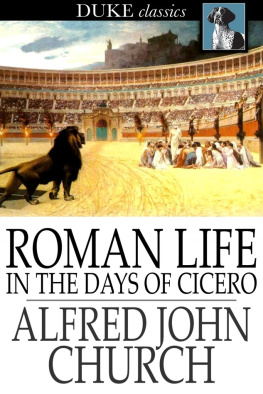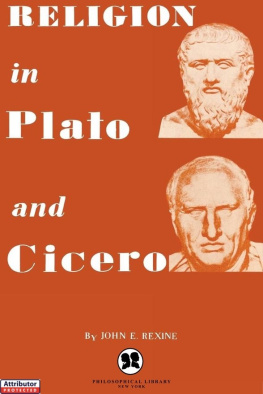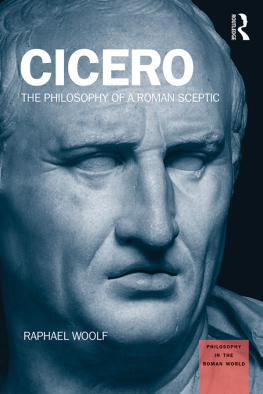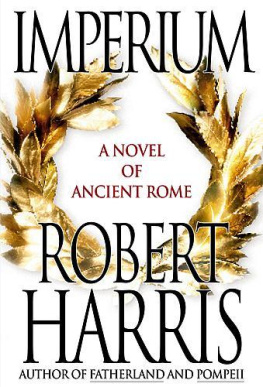ROMAN LIFE IN THE DAYS OF CICERO
* * *
ALFRED JOHN CHURCH
*
Roman Life in the Days of Cicero
First published in 1883
ISBN 978-1-62013-822-9
Duke Classics
2014 Duke Classics and its licensors. All rights reserved.
While every effort has been used to ensure the accuracy and reliability of the information contained in this edition, Duke Classics does not assume liability or responsibility for any errors or omissions in this book. Duke Classics does not accept responsibility for loss suffered as a result of reliance upon the accuracy or currency of information contained in this book.
Contents
*
Preface
*
This book does not claim to be a life of Cicero or a history of the lastdays of the Roman Republic. Still less does it pretend to come intocomparison with such a work as Bekker's Gallus, in which on a slenderthread of narrative is hung a vast amount of facts relating to thesocial life of the Romans. I have tried to group round the centralfigure of Cicero various sketches of men and manners, and so to give myreaders some idea of what life actually was in Rome, and the provincesof Rome, during the first six decadesto speak roughlyof the firstcentury B.C. I speak of Cicero as the "central figure," not as judginghim to be the most important man of the time, but because it is fromhim, from his speeches and letters, that we chiefly derive theinformation of which I have here made use. Hence it follows that I give,not indeed a life of the great orator, but a sketch of his personalityand career. I have been obliged also to trespass on the domain ofhistory: speaking of Cicero, I was obliged to speak also of Caesar andof Pompey, of Cato and of Antony, and to give a narrative, which I havestriven to make as brief as possible, of their military achievements andpolitical action. I must apologize for seeming to speak dogmatically onsome questions which have been much disputed. It would have beenobviously inconsistent with the character of the book to give theopposing arguments; and my only course was to state simply conclusionswhich I had done my best to make correct.
I have to acknowledge my obligations to Marquardt's Privat-Leben derRomer, Mr. Capes' University Life in Ancient Athens, and Mr. Watson'sSelect Letters of Cicero, I have also made frequent use of Mr. AnthonyTrollope's Life of Cicero, a work full of sound sense, thoughcuriously deficient in scholarship.
The publishers and myself hope that the illustrations, giving as thereis good reason to believe they do the veritable likenesses of some ofthe chief actors in the scenes described, will have a special interest.It is not till we come down to comparatively recent times that we findart again lending the same aid to the understanding of history.
Some apology should perhaps be made for retaining the popular title ofone of the illustrations. The learned are, we believe, agreed that thestatue known as the "Dying Gladiator" does not represent a gladiator atall. Yet it seemed pedantic, in view of Byron's famous description, tolet it appear under any other name.
ALFRED CHURCH.
HADLEY GREEN October 8, 1883.
Chapter I - A Roman Boy
*
A Roman father's first duty to his boy, after lifting him up in his armsin token that he was a true son of the house, was to furnish him with afirst name out of the scanty list (just seventeen) to which his choicewas limited. This naming was done on the eighth day after birth, and wasaccompanied with some religious ceremonies, and with a feast to whichkinsfolk were invited. Thus named he was enrolled in some family orstate register. The next care was to protect him from the malignantinfluence of the evil eye by hanging round his neck a gilded bulla, around plate of metal. (The bulla was of leather if he was not ofgentle birth.) This he wore till he assumed the dress of manhood. Thenhe laid it aside, possibly to assume it once more, if he attained thecrowning honor to which a Roman could aspire, and was drawn in triumphup the slope of the Capitol. He was nursed by his mother, or, in anycase, by a free-born woman. It was his mother that had exclusive chargeof him for the first seven years of his life, and had much to say to theordering of his life afterwards. For Roman mothers were not shut up liketheir sisters in Greece, but played no small part in affairswitnessthe histories or legends (for it matters not for this purpose whetherthey are fact or fiction) of the Sabine wives, of Tullia, who stirred upher husband to seize a throne, or Veturia, who turned her son Coriolanusfrom his purpose of besieging Rome. At seven began the education whichwas to make him a citizen and a soldier. Swimming, riding, throwing thejavelin developed his strength of body. He learned at the same time tobe frugal, temperate in eating and drinking, modest and seemly inbehavior, reverent to his elders, obedient to authority at home andabroad, and above all, pious towards the gods. If it was the duty ofthe father to act as priest in some temple of the State (for thepriests were not a class apart from their fellow-citizens), or toconduct the worship in some chapel of the family, the lad would act ascamillus or acolyte. When the clients, the dependents of the house,trooped into the hall in the early morning hours to pay their respectsto their patron, or to ask his advice and assistance in their affairs,the lad would stand by his father's chair and make acquaintance with hishumble friends. When the hall was thrown open, and high festival washeld, he would be present and hear the talk on public affairs or on pasttimes. He would listen to and sometimes take part in the songs whichcelebrated great heroes. When the body of some famous soldier orstatesman was carried outside the walls to be buried or burned, he wouldbe taken to hear the oration pronounced over the bier.
At one time it was the custom, if we may believe a quaint story whichone of the Roman writers tells us, for the senators to introduce theiryoung sons to the sittings of their assembly, very much in the same wayas the boys of Westminster School are admitted to hear the debates inthe Houses of Parliament. The story professes to show how it was thatone of the families of the race of Papirius came to bear the name ofPraetextatus, i.e., clad in the praetexta (the garb of boyhood), andit runs thus:"It was the custom in the early days of the Roman Statethat the senators should bring their young sons into the Senate to theend that they might learn in their early days how great affairs of thecommonwealth were managed. And that no harm should ensue to the city, itwas strictly enjoined upon the lads that they should not say aught ofthe things which they had heard within the House. It happened on a daythat the Senate, after long debate upon a certain matter, adjourned thething to the morrow. Hereupon the son of a certain senator, namedPapirius, was much importuned by his mother to tell the matter which hadbeen thus painfully debated. And when the lad, remembering the commandwhich had been laid upon him that he should be silent about suchmatters, refused to tell it, the woman besought him to speak moreurgently, till at the last, being worn out by her importunities, hecontrived this thing. 'The Senate,' he said, 'debated whether somethingmight not be done whereby there should be more harmony in families thanis now seen to be; and whether, should it be judged expedient to makeany change, this should be to order that a husband should have manywives, or a wife should have more husbands than one.' Then the woman,being much disturbed by the thing which she had heard, hastened to allthe matrons of her acquaintance, and stirred them up not to suffer anysuch thing. Thus it came to pass that the Senate, meeting the next day,were astonished beyond measure to see a great multitude of womengathered together at the doors, who besought them not to make anychange; or, if any, certainly not to permit that a man should have morewives than one. Then the young Papirius told the story how his motherhad questioned him, and how he had devised this story to escape from herimportunity. Thereupon the Senate, judging that all boys might not havethe same constancy and wit, and that the State might suffer damage fromthe revealing of things that had best be kept secret, made this law,that no sons of a senator should thereafter come into the House, saveonly this young Papirius, but that he should have the right to come solong as he should wear the











